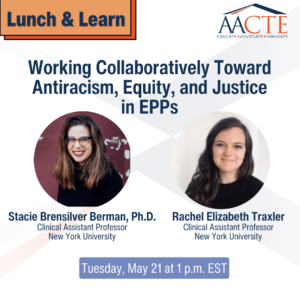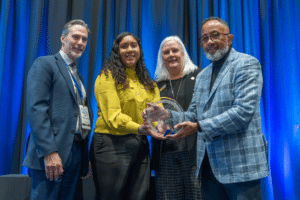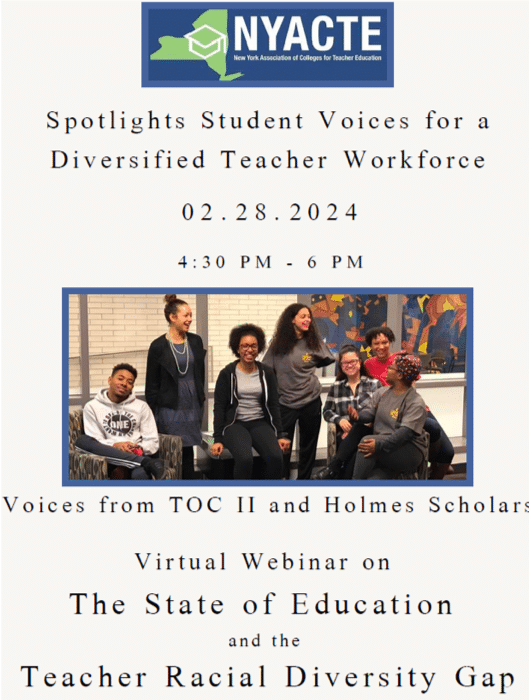20 May2024
Article 5 of Exploring Leadership Diversity in Educator Preparation Programs: An Asian/American Perspective
By Nicholas Hartlep and Rachel Endo
The “Exploring Leadership Diversity in Educator Preparation Programs: An Asian/American Perspective” series is a multi-article study that aims to share the discoveries of a yearlong study that Nicholas D. Hartlep, Ph.D., and Rachel Endo, Ph.D., undertook during the 2023–2024 academic year. Their qualitative study explored the experiences of current and former Asian/American Education Preparation Program (EPP) leaders via surveys and interviews. Join AACTE for the “Building Intentional Pathways for Asian/Americans and Other BIPOC Faculty to Advance in EPP Leadership,” webinar, an opportunity to delve deeper into themes beyond those explored in the series. Register now for this insightful session on May 29 at 12 p.m. EST.
When the study was being designed, it was determined early on to include an advisory board that would help peer-review its design, execution, and text. The co-authors sought current and former Asian/American educator preparation program (EPP) leaders to be on the board as well as subject-matter experts on the Asian/American education experience. Ethnic, gender, and generational balance and institutional and geographic representation were also included in the study. In the end, the following scholar leaders were on the advisory board (see Supplemental Advisory Board Members).
20 May2024
By U.S. Department of Education
The Biden-Harris Administration announced a new record in federal funding and investments in historically black colleges and universities (HBCUs) totaling more than $16 billion from fiscal years (FY) 2021 through current available data for FY 2024. This new reported total is up from the previously announced over $7 billion, and captures significant additional actions already undertaken. The total of more than $16 billion includes over $11.4 billion between FY2021 and FY2023 through federal grants, contracting awards, and debt relief for HBCUs; over $4 billion between FY2021 and FY2023 for HBCU-enrolled students through federal financial aid and educational benefits for veterans; and, so far in FY 2024, over $900 million has been secured for Department of Education (Department) programs strengthening HBCUs as institutions.
17 May2024
By AACTE

In the New York University (NYU) Teacher Residency (TR) program, faculty and staff believe that the best ideas, work, and results derive from collaboration. The TR program undergoes collaboratively generated and consensus-driven changes and iterations each year, all in an effort to prepare diverse cohorts of residents to teach and meet their learners’ needs. On Tuesday, May 21, from 1:00 – 1:45 p.m. ET, members are invited to learn more about this TR program by attending the AACTE Lunch & Learn, “Working Collaboratively Toward Antiracism, Equity, and Justice in EPPs.”
14 May2024
Article 4 of Exploring Leadership Diversity in Educator Preparation Programs: An Asian/American Perspective
By Nicholas Hartlep and Rachel Endo
Most would agree, even if they have never been one, that being a dean is difficult work; the average tenure of an education dean is four (4) to six (6) years (Wepner & Henk, 2020). But we do not know if there are differentials based on the person’s race/ethnicity. One level of Whiteness in EPPs is the faculty and staff who work within them. EPPs are composed of mostly White teacher education faculty who teach their pre-service teacher education students using a White-framed curriculum. Another level of Whiteness is the epistemologies that White EPP leaders deploy (Scheurich & Young, 1997; Teo, 2022). The authors of this article have experienced this latter form of Whiteness when they interviewed for EPP leadership positions (see Hartlep, 2025).
14 May2024
Article 3 of Exploring Leadership Diversity in Educator Preparation Programs: An Asian/American Perspective
By Nicholas Hartlep and Rachel Endo
The “Exploring Leadership Diversity in Educator Preparation Programs: An Asian/American Perspective” series is a multi-article study that aims to share the discoveries of a yearlong study that Nicholas D. Hartlep, Ph.D., and Rachel Endo, Ph.D., undertook during the 2023–2024 academic year. Their qualitative study explored the experiences of current and former Asian/American Education Preparation Program (EPP) leaders via surveys and interviews.
What is Critical Race Theory?
An extensive overview of Critical Race Theory (CRT) is located online. Tara J. Yosso, in her article “Whose culture has capital? A critical race theory discussion of community cultural wealth” shares the image below that shows the different branches of CRT. Yosso writes, “CRT’s branches are not mutually exclusive or in contention with one another. Naming, theorizing, and mobilizing from the intersections of racism, need not initiate some sort of oppression sweepstakes—a competition to measure one form of oppression against another” (2005, pp. 72–73).
06 May2024
Article 2 of Exploring Leadership Diversity in Educator Preparation Programs: An Asian/American Perspective
By Rachel Endo and Nicholas Hartlep

The “Exploring Leadership Diversity in Educator Preparation Programs: An Asian/American Perspective” series is a multi-article study that aims to share the discoveries of a yearlong study that Nicholas D. Hartlep, Ph.D., and Rachel Endo, Ph.D., undertook during the 2023–2024 academic year. Their qualitative study explored the experiences of current and former Asian/American Education Preparation Program (EPP) leaders via surveys and interviews. The first two articles of this series will set the stage for continuation.
In this article, the authors highlight current demographic trends of PK-12 teachers/students and higher education faculty/students. The authors argue that there is a democratic imperative that educator preparation programs (EPPs) diversify their leadership.
06 May2024
Article 1 of Exploring Leadership Diversity in Educator Preparation Programs: An Asian/American Perspective
By Rachel Endo and Nicholas Hartlep

Introduction
The “Exploring Leadership Diversity in Educator Preparation Programs: An Asian/American Perspective” series is a multi-article study that aims to share the discoveries of a yearlong study that Nicholas D. Hartlep, Ph.D., and Rachel Endo, Ph.D., undertook during the 2023–2024 academic year. Their qualitative study explored the experiences of current and former Asian/American Education Preparation Program (EPP) leaders via surveys and interviews. The first two articles of this series will set the stage for continuation.
In this article, the authors introduce themselves and their leadership perspectives as Asian/Americans. This thought leadership series is being sponsored by AACTE and focuses on Asian/American Leaders of educator preparation programs (EPPs).
08 Apr2024
By Nicole Dunn

We invite you to join AACTE in celebrating Arab American Heritage Month. This annual observance is a significant opportunity to recognize and honor the vibrant heritage and invaluable contributions of Arab Americans in our schools and communities. There are an estimated 3.7 million Arab Americans in the U.S.; however, schools are often unable to identify students who are Arab American because they are classified as White by the United States Census Bureau (SPLC Learning For Justice, 2021).
02 Apr2024
A 2024 AACTE Session Recap and Reflection
By Mayra Marquez-Mendez
The session “Diversifying the Teaching Profession: Strategies for Success” provided invaluable insights into evaluating, reimagining, and implementing supportive models for diversifying the teaching profession. The presenters reflected and provided various perspectives to emphasize the importance of having a diverse teaching workforce to support culturally and linguistically diverse students across the United States. Key highlights from the presentation include the importance of providing high-quality instruction for our students, which begins with teachers, leaders, and districts nationwide through excellent lines of work in teacher preparation, professional learning, education policy, and diversity, equity, and inclusion by explaining local and national strategies to diversify the teaching profession.
In this session, the discussion centered on the need to diversify the teaching profession locally and nationally. More specifically, the focus was on the innovative work being done by The Public Education Business Coalition (PEBC) in Colorado, which has a proven track record of successfully reaching and attracting a diverse pool of potential educators across the United States. With a national reach, the PEBC is leading the charge in promoting high-quality instruction by collaborating with teachers, leaders, and districts nationwide. Their work spans various areas, including teacher preparation, professional learning, education policy, diversity, equity, and inclusion. By leveraging their expertise in these areas, the PEBC is helping to create a more inclusive and equitable teaching profession that better reflects the diverse student population in our schools.
26 Mar2024
By AACTE
AACTE has recognized Howard University with the 2024 AACTE Best Practice Award in Support of Global and International Perspectives for its elementary education program that integrates global experiences into the curriculum. On Thursday, April 4, from 1:00 to 1:45 p.m. ET, AACTE will host a Lunch & Learn where members can learn more about this program and how it serves as an exemplar in the intercultural, global, and cross-cultural arenas.
The Best Practice Award in Support of Global and International Perspectives is sponsored by AACTE’s Committee on Global Diversity as part of its mission to ensure that a global/ international perspective is brought to policy and programs associated with the preparation of education professionals.
26 Mar2024
By Erika Moore
Navigating the dynamic landscape of higher education in Florida as a Black woman academic presents a unique set of challenges in today’s political climate. However, amidst these challenges lies an opportunity to catalyze transformation for future generations. As minority women, we often find ourselves in spaces where representation is lacking, our voices may be marginalized, and the path forward appears uncertain. According to the National Center for Education Statistics, Black faculty represent only about 6% of all faculty in colleges and universities. Furthermore, 2% of full and 5% of assistant professors are Black women. Many Black women in academia struggle to find support from mentors and influential figures who can advocate for their advancement into leadership positions. Navigating one’s career becomes even more daunting when access to cultural or social capital is limited.
From my journey as an undergraduate student to a doctoral candidate, my mentors have instilled in me the belief that my presence in this space is a personal triumph and a legacy for those who came before me and those who will follow. This conviction has been my guiding light throughout my higher education journey. As a faculty member at a predominantly white institution (PWI), I intentionally mentor, coach, support, and empower minority women in academia. Mentorship is a powerful tool through which I aim to model the type of servant leadership needed in education.
11 Mar2024
By Brooke Evans
 AACTE Lunch & Learns return on Wednesday, March 20 from 1:00 – 1:45 p.m. ET with guests from the University of Northern Colorado’s (UNC) Award-Winning Center for Urban Education.
AACTE Lunch & Learns return on Wednesday, March 20 from 1:00 – 1:45 p.m. ET with guests from the University of Northern Colorado’s (UNC) Award-Winning Center for Urban Education.
UNC is the inaugural recipient of the AACTE 2024 Increasing Educator Diversity: Promising Practice Award. Overseen by AACTE’s Programmatic Advisory Committee on Educator Diversity, this award, recognizes a promising practice from a school, college, or department of education demonstrating outcomes and advocacy related to various activities, practices, programs, pedagogies, systems, and/or policies that lead to or is likely to lead to, an increase in educator diversity.
29 Feb2024
2024 Best Practice Award in Support of Global and International Perspectives Winner
By Katherine E. L. Norris
 Receiving the Best Practice Award in Support of Global and International Perspectives at the AACTE 2024 Annual Meeting was a complete honor. It was not lost on us, a historically black college and university (HBCU), that we received this acknowledgment for a program that celebrates and studies the lifestyles, cultures, histories, and lived experiences of those from the African diaspora during Black History Month.
Receiving the Best Practice Award in Support of Global and International Perspectives at the AACTE 2024 Annual Meeting was a complete honor. It was not lost on us, a historically black college and university (HBCU), that we received this acknowledgment for a program that celebrates and studies the lifestyles, cultures, histories, and lived experiences of those from the African diaspora during Black History Month.
At Howard University, the study of Black history is not confined to one month, but Black History is woven throughout the programming, curricula, and the practices in our teacher education programs throughout the year. Our Elementary Education program ends with a culminating international experience where teacher candidates get to participate in a weeklong cultural immersion experience engaging in a breadth of activities and experiences that fully immerse them in the culture of the country. Our travel thus far has been to Cuba and Colombia (Cartagena, Cali, and Palenque). Palenque, the first free town in the Americas founded by those who fled slavery during Colonia times, always seems to be a favorite learning experience for the teacher candidates. The locations chosen have large populations of those with shared African heritage and where English is not their first language. While this international experience takes place in the Elementary Education program’s final semester, much of the learning and activities that happen throughout the time in the program have led to this final initiative.
22 Feb2024
By AACTE
 The robust support from AACTE’s state affiliates bolsters our unified advocacy endeavors, fostering the exchange of invaluable experience and expertise. In addition, it opens doors to diverse professional development opportunities for our members. With great enthusiasm, we are delighted to announce an upcoming development opportunity, accessible to all, presented by our New York Chapter.
The robust support from AACTE’s state affiliates bolsters our unified advocacy endeavors, fostering the exchange of invaluable experience and expertise. In addition, it opens doors to diverse professional development opportunities for our members. With great enthusiasm, we are delighted to announce an upcoming development opportunity, accessible to all, presented by our New York Chapter.
The New York Association of Colleges for Teacher Education (NYACTE) will host a webinar on February 28, 2024, to highlight student perspectives regarding the current status of education and the racial diversity gap among teachers in New York. Students enrolled in educator preparation programs in New York, as well as those associated with the My Brother’s Keeper Teacher Opportunity Corps (TOC II) and AACTE Holmes Masters programs, will impart their perspectives and personal experiences with the current state of education. You will also develop an awareness and admiration for the importance of programs like TOC II and Holmes in helping to eliminate obstacles to workforce diversity.
Register for this webinar online.
05 Feb2024
By Nicole Dunn
Black History Month is not merely a reflection on the past; it is a call to action, an opportunity to amplify Black voices and contributions within the realm of education. This year, we extend an enthusiastic invitation to all AACTE members, educators, and education leaders to join us in embracing excellence as we celebrate Black History Month.
As educator preparation programs (EPPs) that produce our country’s educators and education leaders, we play a pivotal role in shaping the minds of the next generation. By actively participating in Black History Month celebrations, we create a space that fosters inclusivity, diversity, and a genuine appreciation for the contributions of Black individuals in educator preparation.
February is also the month of AACTE’s 2024 Annual Meeting, with the theme of Ascending New Heights: Propelling the Profession Into the Future. Part of the work to achieve a future that fully embraces and celebrates a diverse study body is actively participating in the celebration of Black history. Celebrate and engage with us February 16– 18 at the Annual Meeting events below that feature Black excellence and advocate for inclusive and enriched educational experiences for all.
This list is not an exhaustive list of all sessions and speakers that represent or are speaking to Black educator preparation topics. For a full list and to plan your experience visit the Annual Meeting 2024 Online Planner.










 AACTE Lunch & Learns return on Wednesday, March 20 from 1:00 – 1:45 p.m. ET with guests from the University of Northern Colorado’s (UNC) Award-Winning Center for Urban Education.
AACTE Lunch & Learns return on Wednesday, March 20 from 1:00 – 1:45 p.m. ET with guests from the University of Northern Colorado’s (UNC) Award-Winning Center for Urban Education. Receiving the Best Practice Award in Support of Global and International Perspectives at the AACTE 2024 Annual Meeting was a complete honor. It was not lost on us, a historically black college and university (HBCU), that we received this acknowledgment for a program that celebrates and studies the lifestyles, cultures, histories, and lived experiences of those from the African diaspora during Black History Month.
Receiving the Best Practice Award in Support of Global and International Perspectives at the AACTE 2024 Annual Meeting was a complete honor. It was not lost on us, a historically black college and university (HBCU), that we received this acknowledgment for a program that celebrates and studies the lifestyles, cultures, histories, and lived experiences of those from the African diaspora during Black History Month.  The robust support from AACTE’s state affiliates bolsters our unified advocacy endeavors, fostering the exchange of invaluable experience and expertise. In addition, it opens doors to diverse professional development opportunities for our members. With great enthusiasm, we are delighted to announce an upcoming development opportunity, accessible to all, presented by our New York Chapter.
The robust support from AACTE’s state affiliates bolsters our unified advocacy endeavors, fostering the exchange of invaluable experience and expertise. In addition, it opens doors to diverse professional development opportunities for our members. With great enthusiasm, we are delighted to announce an upcoming development opportunity, accessible to all, presented by our New York Chapter.